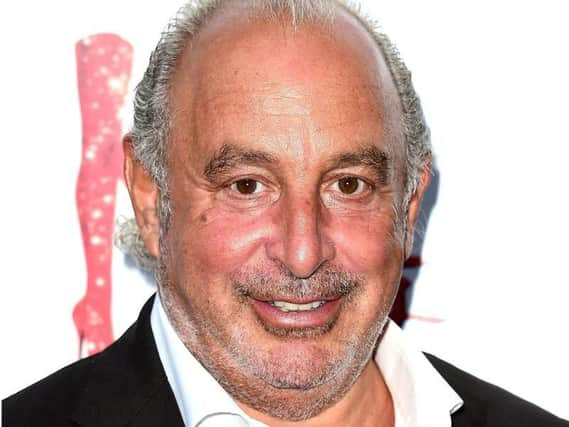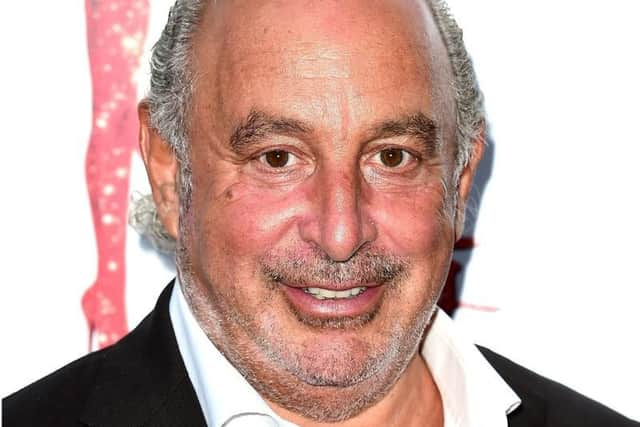Sir Philip Green touched women's breasts and slapped bottoms, peer claims


Hundreds of grievance cases against the retail tycoon were raised by staff, the House of Lords was told on Thursday.
The allegations were revealed by Lord Hain at Westminster, who last year used the cloak of parliamentary privilege to identify the Topshop boss as the person behind a legal injunction preventing the Daily Telegraph from publishing allegations of sexual harassment and racial abuse.
Advertisement
Hide AdAdvertisement
Hide AdSir Philip previously "categorically and wholly" denied the claims.


Responding to Lord Hain's latest claims, he said: "How sad somebody who already has proven they're prepared to abuse the system wants to continue to behave in this manner."
Lord Hain said he was revealing the account of a victim for the first time as he defended the use of parliamentary privilege.
Speaking during a debate in the Lords, Lord Hain said he had originally named the businessman "for moral reasons and was not second-guessing or criticising the judiciary".
Advertisement
Hide AdAdvertisement
Hide AdHe said: "To explain why, I am revealing for the first time in public exactly what one of Sir Philip Green's victims told me whilst pleading with me to name him under parliamentary privilege.
"I quote: 'He was touching and repeatedly slapping women staff's bottoms, grabbing thighs and touching legs.
"'Hundreds of grievance cases were raised with HR. The company lawyer who interviewed me then lied. Sir Philip screamed and shouted at staff 'to go to psychologists'.
"'Victims went to an employment tribunal but were told it would not get anywhere so settled with an NDA (non-disclosure agreement).
Advertisement
Hide AdAdvertisement
Hide Ad"'Some were worn down with spiralling legal costs costing them a fortune. He broke some in the end. It was horrible ... He is still doing exactly the same thing. It is rife, it happened all the time. I saw him grab the breasts of others. This has gone on for long time'."
Lord Hain pointed out that after he named Sir Philip, a number of former employees and executives made similar allegations in the newspapers.
He told peers: "My motive was to stand up for ordinary employees against a very powerful and wealthy boss who, as described to me, seemed to think he was above the rules of decent, respectful behaviour."
He also said he was acting against the misuse of NDAs which Sir Philip "deployed to suppress victims from obtaining redress - as did Harvey Weinstein to silence his sexual harassment victims, as did organisers of the Presidents Club dinner in January 2018, when 130 women were required to sign NDAs in a bid to stop any details of harassment, groping and propositioning going public".
Advertisement
Hide AdAdvertisement
Hide AdHe argued that parliamentary privilege is "a fundamental part of our constitution and is the only absolute free speech right entrenched in the law".
Lord Hain said the prospect of it being used "should be a deterrent to anyone minded to seek a secrecy order from the courts to cover up allegations of misconduct as in the Philip Green case".
The veteran politician was criticised at the time for naming Sir Philip, as some lawyers and legal experts said it was an abuse of parliamentary privilege, although he was backed by many MPs.
But Lord Hain pointed out there had been "similar outrage from the legal establishment" when it was used to name notorious spy Kim Philby.
Advertisement
Hide AdAdvertisement
Hide AdHe acknowledged it "should be used responsibly, sparingly and only when absolutely necessary".
Lord Hain said: "In my 30-year parliamentary career I have used it just twice before - in 2000 when I named traffickers selling arms for 'blood diamonds' fuelling wars in Africa, and then in 2017-18 British corporations complicit in former President Zuma's corrupt activities in South Africa.
"These, like my Sir Philip Green intervention, exposed gross injustice in the public interest when the law was clearly failing to do so, and are living proof of parliamentary sovereignty - irrespective of the wishes of the executive, the powerful, and the wealthy, and even rulings by the legal establishment when it covers up allegations of misconduct."
Warning against any move to curb parliamentary sovereignty, Lord Hain said: "A parliamentarian's right to exercise privilege conscientiously is an important safeguard for the liberty of the subject.
Advertisement
Hide AdAdvertisement
Hide Ad"It should not be whittled away by turning the Speaker and Lord Speaker into pre-vetting police officers with a censorship role.
"Nor should the sovereignty of judges override the sovereignty of Parliament."
He was responding to criticism by former justice of the Supreme Court Lord Brown of Eaton-under-Heywood, who argued that in his original decision to use parliamentary privilege to name Sir Philip, Lord Hain "acted wrongly" and Parliament should try to prevent such an "abuse" recurring.
He said of Lord Hain's actions: "I regard his statement as a misuse, indeed I would suggest a clear abuse, of privilege."
Advertisement
Hide AdAdvertisement
Hide AdBut he said he did not wish to see the Labour peer disciplined.
Lord Brown said: "I accept Lord Hain is an honourable man but I reject utterly his suggestion that his own subjective view of what is right must always prevail over a court order."
The independent crossbench peer said the Lords must guard against "any future such egregious exercise of parliamentary privilege", insisting it was "essential to protect the rule of law and the reputation of this House".
Lord Brown said he recognised the fundamental importance of peers being able to speak freely in Parliament but could not accept that parliamentary privilege must always prevail over all competing interests.
Advertisement
Hide AdAdvertisement
Hide AdThere was an obligation on members to respect the independence of the courts and the rule of law, he said. Criticising the "intentional flouting" of a court order, Lord Brown said: "Surely even unpopular people like Philip Green are entitled to the protection of the courts."
He added: "The time has come when we should recognise an abuse for what it is and try to limit its recurrence in future."
Former chairman of the Bar Standards Board, Baroness Deech said parliamentary privilege was meant to help parliamentarians hold the Executive to account over issues like national emergencies or corruption by officials or ministers.
"The Philip Green issue was not urgent, was not of national importance, the economy or security," she said.
Advertisement
Hide AdAdvertisement
Hide Ad"A peer who takes it on him or herself to flout a court order will not have heard all the evidence as to why the court ordered anonymity."
Lady Deech, an independent crossbench peer, said members had to exercise self-discipline and remind themselves of the important role played by judicial independence and parliamentary privilege, side by side.
If they failed to respect the rules and acted irresponsibly, the punishment was not contempt of court but forfeiting the trust and respect of colleages, she warned.